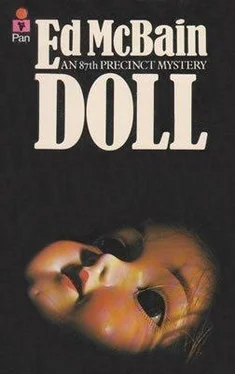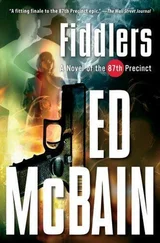Ed McBain - Doll
Здесь есть возможность читать онлайн «Ed McBain - Doll» весь текст электронной книги совершенно бесплатно (целиком полную версию без сокращений). В некоторых случаях можно слушать аудио, скачать через торрент в формате fb2 и присутствует краткое содержание. Город: London, Год выпуска: 1976, ISBN: 1976, Издательство: Pan, Жанр: Полицейский детектив, на английском языке. Описание произведения, (предисловие) а так же отзывы посетителей доступны на портале библиотеки ЛибКат.
- Название:Doll
- Автор:
- Издательство:Pan
- Жанр:
- Год:1976
- Город:London
- ISBN:978-0330248235
- Рейтинг книги:3 / 5. Голосов: 1
-
Избранное:Добавить в избранное
- Отзывы:
-
Ваша оценка:
- 60
- 1
- 2
- 3
- 4
- 5
Doll: краткое содержание, описание и аннотация
Предлагаем к чтению аннотацию, описание, краткое содержание или предисловие (зависит от того, что написал сам автор книги «Doll»). Если вы не нашли необходимую информацию о книге — напишите в комментариях, мы постараемся отыскать её.
Doll — читать онлайн бесплатно полную книгу (весь текст) целиком
Ниже представлен текст книги, разбитый по страницам. Система сохранения места последней прочитанной страницы, позволяет с удобством читать онлайн бесплатно книгу «Doll», без необходимости каждый раз заново искать на чём Вы остановились. Поставьте закладку, и сможете в любой момент перейти на страницу, на которой закончили чтение.
Интервал:
Закладка:
Ed McBain
Doll
This, too, is for
Dodie and Ray Crane
The city in these pages is imaginary.
The people, the places are all fictitious.
Only the police routine is based on established
investigatory technique.
Chapter 1
The child Anna sat on the floor close to the wall and played with her doll, talking to it, listening. She could hear the voices raised in anger coming from her mother’s bedroom through the thin separating wall, but she busied herself with the doll and tried not to be frightened. The man in her mother’s bedroom was shouting now. She tried not to hear what he was saying. She brought the doll close to her face and kissed its plastic cheek, and then talked to it again, and listened.
In the bedroom next door, her mother was being murdered.
Her mother was called Tinka, a chic and lacquered label concocted by blending her given name, Tina, with her middle name, Karin. Tinka was normally a beautiful woman, no question about it. She’d have been a beautiful woman even if her name was Beulah. Or Bertha. Or perhaps even Brunhilde. The Tinka tag only enhanced her natural good looks, adding an essential gloss, a necessary polish, an air of mystery and adventure.
Tinka Sachs was a fashion model.
She was, no question about it, a very beautiful woman. She possessed a finely sculptured face that was perfectly suited to the demands of her profession, a wide forehead, high pronounced cheekbones, a generous mouth, a patrician nose, slanted green eyes flecked with chips of amber; oh, she was normally a beauty, no question about it. Her body was a model’s body, lithe and loose and gently angled, with long slender legs, narrow hips, and a tiny bosom. She walked with a model’s insinuating glide, pelvis tilted, crotch cleaving the air, head erect. She laughed with a model’s merry shower of musical syllables, painted lips drawing back over capped teeth, amber eyes glowing. She sat with a model’s carelessly draped ease, posing even in her own living room, invariably choosing the wall or sofa that best offset her clothes, or her long blonde hair, or her mysterious green eyes flecked with chips of amber; oh, she was normally a beauty.
She was not so beautiful at the moment.
She was not so beautiful because the man who followed her around the room shouting obscenities at her, the man who stalked her from wall to wall and boxed her into the narrow passage circumscribed by the king-sized bed and the marble-topped dresser opposite, the man who closed in on her oblivious to her murmuring, her pleading, her sobbing, the man was grasping a kitchen knife with which he had been slashing her repeatedly for the past three minutes.
The obscenities spilled from the man’s mouth in a steady unbroken torrent, the anger having reached a pitch that was unvaried now, neither rising nor falling in volume or intensity. The knife blade swung in a short, tight arc, back and forth, its rhythm as unvaried as that of the words that poured from the man’s mouth. Obscenities and blade, like partners in an evil copulation, moved together in perfect rhythm and pitch, enveloping Tinka in alternating splashes of blood and spittle. She kept murmuring the man’s name pleadingly, again and again, as the blade ripped into her flesh. But the glittering arc was relentless. The razor-sharp blade, the monotonous flow of obscenities, inexorably forced her bleeding and torn into the far comer of the room, where the back of her head collided with an original Chagall, tilting it slightly askew, the knife moving in again in its brief terrifying arc, the blade slicing parallel bleeding ditches across her small breasts and moving lower across the flat abdomen, her peignoir tearing again with a clinging silky blood-sotted sound as the knife blade plunged deeper with each step closer he took. She said his name once more, she shouted his name, and then she murmured the word ‘Please’, and then she fell back against the wall again, knocking the Chagall from its hook so that a riot of framed color dropped heavily over her shoulder, falling in a lopsided angle past the long blonde hair, and the open red gashes across her throat and naked chest, the tattered blue peignoir, the natural brown of her exposed pubic hair, the blue satin slippers. She fell gasping for breath, spitting blood, headlong over the painting, her forehead colliding with the wide oaken frame, her blonde hair covering the Chagall reds and yellows and violets with a fine misty golden haze, the knife slash across her throat pouring blood onto the canvas, setting her hair afloat in a pool of red that finally overspilled the oaken frame and ran onto the carpet.
Next door, the child Anna clung fiercely to her doll.
She said a reassuring word to it, and then listened in terror as she heard footfalls in the hall outside her closed bedroom door. She kept listening breathlessly until she heard the front door to the apartment open and then close again.
She was still sitting in the bedroom, clutching her doll, when the superintendent came up the next morning to change a faucet washer Mrs Sachs had complained about the day before.
April is the fourth month of the year.
It is important to know that — if you are a cop, you can sometimes get a little confused.
More often than not, your confusion will be compounded of one pan exhaustion, one part tedium, and one part disgust. The exhaustion is an ever-present condition and one to which you have become slowly accustomed over the years. You know that the department does not recognize Saturdays, Sundays, or legal holidays, and so you are even prepared to work on Christmas morning if you have to, especially if someone intent on committing mischief is inconsiderate enough to plan it for that day — witness General George Washington and the unsuspecting Hessians, those drunks. You know that a detective’s work schedule does not revolve around a fixed day, and so you have learned to adjust to your odd waking hours and your shorter sleeping time, but you have never been able to adjust to the nagging feeling of exhaustion that is the result of too much crime and too few hours, too few men to pit against it. You are sometimes a drag at home with your wife and children, but that is only because you are tired, boy what a life, all work and no play, wow.
The tedium is another thing again, but it also helps to generate confusion. Crime is the most exciting sport in the world, right? Sure, ask anybody. Then how come it can be so boring when you’re a working cop who is typing reports in triplicate and legging it all over the city talking to old ladies in flowered house dresses in apartments smelling of death? How can the routine of detection become something as prescribed as the ritual of a bullfight, never changing, so that even a gun duel in a nighttime alley can assume familiar dimensions and be regarded with the same feeling of ennui that accompanies a routine request to the B.C.I.? The boredom is confusing as hell. It clasps hands with the exhaustion and makes you wonder whether this is January or Friday.
The disgust comes into it only if you are a human being. Some cops aren’t. But if you are a human being, you are sometimes appalled by what your fellow human beings are capable of doing. You can understand lying because you practice it in a watered-down form as a daily method of smoothing the way, helping the machinery of mankind to function more easily without getting fouled by too much truth-stuff. You can understand stealing because when you were a kid you sometimes swiped pencils from the public school supply closet, and once a toy airplane from the five and ten. You can even understand murder because there is a dark and secret place in your own heart where you have hated deeply enough to kill. You can understand all these things, but you are nonetheless disgusted when they are piled upon you in profusion, when you are constantly confronted with liars, thieves and slaughterers, when all human decency seems in a state of suspension for the eight or twelve or thirty-six hours you are in the squadroom or out answering a squeal. Perhaps you could accept an occasional corpse — death is only a part of life, isn’t it? It is corpse heaped upon corpse that leads to disgust and further leads to confusion. If you can no longer tell one corpse from another, if you can no longer distinguish one open bleeding head from the next, then how is April any different from October?
Читать дальшеИнтервал:
Закладка:
Похожие книги на «Doll»
Представляем Вашему вниманию похожие книги на «Doll» списком для выбора. Мы отобрали схожую по названию и смыслу литературу в надежде предоставить читателям больше вариантов отыскать новые, интересные, ещё непрочитанные произведения.
Обсуждение, отзывы о книге «Doll» и просто собственные мнения читателей. Оставьте ваши комментарии, напишите, что Вы думаете о произведении, его смысле или главных героях. Укажите что конкретно понравилось, а что нет, и почему Вы так считаете.












